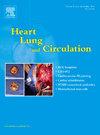Impact of Deep Sternal Wound Infection on Long-Term Survival Based on Revascularisation Strategy: Results From the Polish National Registry
IF 2.2
4区 医学
Q2 CARDIAC & CARDIOVASCULAR SYSTEMS
引用次数: 0
Abstract
Background
This multicentre study aimed to investigate the impact of deep sternal wound infection (DSWI) on long-term survival among patients undergoing coronary artery bypass grafting (CABG) using multiple arterial grafting (MAG) or single artery with saphenous vein grafts (SAG).
Methods
Data were obtained from the Polish National Registry of Cardiac Surgery Procedures database. Between January 2012 and December 2020, 81,136 patients who underwent CABG for multivessel disease were included in the study. Patients were divided into four groups: MAG with DSWI (n=219), MAG without DSWI (n=8,611), SAG with DSWI (n=1,432), and SAG without DSWI (n=70,874). Inverse probability of treatment weighting based on the generalised propensity score was used to minimise imbalance between the groups.
Results
In the weighted sample, DSWI in patients who received MAG was associated with reduced long-term survival when compared with patients without DSWI and MAG (hazard ratio [HR] 1.89, 95% confidence interval [CI] 1.29–2.78; Bonferroni corrected p=0.01). Deep sternal wound infection in patients who received SAG was associated with reduced long-term survival when compared with patients without DSWI and SAG (HR 1.92, 95% CI 1.69–2.17; Bonferroni corrected p=0.01). In patients who did not develop DSWI, MAG was associated with improved long-term survival compared with SAG (HR 0.68, 95% CI 0.63–0.74; Bonferroni corrected p=0.01). However, patients who received MAG and developed DSWI had similar long-term survival when compared with patients who received SAG and did not develop DSWI (HR 1.31, 95% CI 0.90–1.92; Bonferroni corrected p=0.63). A landmark analysis excluding the first 6 months of follow-up was performed to exclude the risk of acute mortality due to DSWI. In the weighted sample, the results were consistent with the main analysis.
Conclusion
Deep sternal wound infection is associated with worse survival in patients receiving MAG and SAG. Moreover, the superior effect of MAG over SAG diminishes once DSWI develops.
基于血运重建策略的深胸骨伤口感染对长期生存的影响:来自波兰国家登记处的结果。
背景:本多中心研究旨在探讨胸骨深部伤口感染(DSWI)对采用多动脉移植(MAG)或单动脉隐静脉移植(SAG)行冠状动脉旁路移植术(CABG)患者长期生存的影响。方法:数据来自波兰国家心脏手术程序注册数据库。在2012年1月至2020年12月期间,81136例因多血管疾病接受CABG的患者被纳入研究。患者分为四组:有DSWI的MAG组(n=219)、没有DSWI的MAG组(n= 8611)、有DSWI的SAG组(n= 1432)和没有DSWI的SAG组(n= 70874)。使用基于广义倾向评分的治疗加权逆概率来最小化组间的不平衡。结果:在加权样本中,与没有DSWI和MAG的患者相比,接受MAG的患者的DSWI与长期生存率降低相关(风险比[HR] 1.89, 95%可信区间[CI] 1.29-2.78;Bonferroni校正p=0.01)。与没有DSWI和SAG的患者相比,接受SAG的患者的深胸骨伤口感染与长期生存率降低相关(HR 1.92, 95% CI 1.69-2.17;Bonferroni校正p=0.01)。在未发生DSWI的患者中,与SAG相比,MAG与改善的长期生存相关(HR 0.68, 95% CI 0.63-0.74;Bonferroni校正p=0.01)。然而,与接受SAG治疗但未发生DSWI的患者相比,接受MAG治疗并发生DSWI的患者的长期生存率相似(HR 1.31, 95% CI 0.90-1.92;Bonferroni校正p=0.63)。进行了一项里程碑式的分析,不包括前6个月的随访,以排除由于社会福利和社会发展倡议造成的急性死亡风险。在加权样本中,结果与主分析一致。结论:胸骨深部伤口感染与MAG和SAG联合治疗患者的生存期较差有关。此外,一旦DSWI增加,MAG对SAG的优势作用就会减弱。
本文章由计算机程序翻译,如有差异,请以英文原文为准。
求助全文
约1分钟内获得全文
求助全文
来源期刊

Heart, Lung and Circulation
CARDIAC & CARDIOVASCULAR SYSTEMS-
CiteScore
4.50
自引率
3.80%
发文量
912
审稿时长
11.9 weeks
期刊介绍:
Heart, Lung and Circulation publishes articles integrating clinical and research activities in the fields of basic cardiovascular science, clinical cardiology and cardiac surgery, with a focus on emerging issues in cardiovascular disease. The journal promotes multidisciplinary dialogue between cardiologists, cardiothoracic surgeons, cardio-pulmonary physicians and cardiovascular scientists.
 求助内容:
求助内容: 应助结果提醒方式:
应助结果提醒方式:


